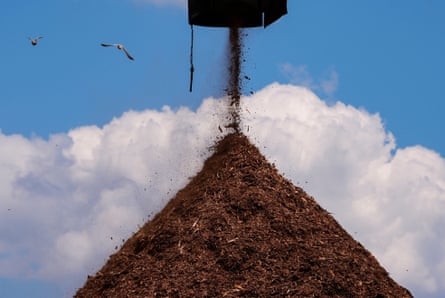Ten lawsuits have been filed against Drax after diagnoses of asthma allegedly linked to its wood pellet fuel, it has been revealed.
Current and former workers at the UK’s largest power station claim they have not been adequately protected against sustained exposure to wood dust, which can cause serious health problems including asthma, dermatitis and nasal cancer.
Six compensation claims were settled out of court and four have trial dates in 2026, an investigation by Land and Climate Review found.
A class action lawsuit was also filed against the company this month over health concerns in the US, representing 700 people who live near one of Drax’s wood pellet mills in Mississippi. The company is also being investigated by the UK Financial Conduct Authority over “historical statements” made about its wood pellet fuel.
Drax power station was originally built to burn coal, but has relied fully on biomass since 2023. The conversion took place over two decades, funded with billions of pounds in subsidies from UK bill payers. The UK government is negotiating Drax’s next biomass subsidy contract, which will run from 2027 to 2031.
Drax’s pellets are made by compressing wood dust at high pressures and are then ground back into dust in mills at the Yorkshire site before being burned.
Neil Lindridge, a former mechanical fitter at Drax, described the dust as “so fine that you can only see it in sunlight”.
Martyn Sweet, another former worker, said that he and others in the on-site mills “weren’t told anything” before Drax began trialling biomass in the 2000s.
Within five years of Sweet noticing “yellow specks of stuff mixed in with the coal,” he was having regular colds, flu and chest infections. He then began to have asthma attacks, sometimes immediately after arriving on site. He was eventually taken to hospital twice, including a three-day stay for double pneumonia.
It was in 2015, when a specialist diagnosed him with industrial asthma, that he said “it all dropped into place”.
Sweet said Drax’s head of safety and environment asked him: “Where do you think you’ve been exposed to biomass?”
“Everywhere,” he replied.

Sweet was the first of 10 people to sue Drax over health problems diagnostically linked to biomass. The lawsuits followed three improvement notices filed by the Health and Safety Executive (HSE), after investigators “identified significant contraventions of health and safety law” in 2016.
Drax pleaded not guilty to criminal charges in 2022, before HSE dropped its prosecution case in 2023. An HSE spokesperson said it undertook a “lengthy and thorough investigation” but new information that emerged in late 2022 meant there was “no longer a reasonable prospect of securing a conviction for the most serious failings alleged”. HSE said at the time: “There is no evidence of continuing risk of harm from exposure to wood dust at the Drax power station.”
While working at Drax, Lindridge developed such severe breathing problems that he could only sleep sitting upright in a chair. As well as asthma, he suffered from rhinitis and developed polyps in his nose that had to be surgically removed.
Richard Foster, a regional manager at Unite until 2024, said evidence may be missed because workers were hesitant to report health and safety concerns. “Young lads with families and massive mortgages” fear being “blacklisted”, he said.
James (not his real name), a contractor who works on site, said that stricter policies on PPE and cleaning were not enough: “Everyone [on site] comes into contact with biomass … it’s on the scaffolds, on the bins, everywhere.”
Drax executives internally acknowledged that European facilities fuelled by locally sourced wood chips had fewer challenges with dust control, but that Drax’s pellets were lighter to ship across the Atlantic Ocean.
Drax’s GMB representative, Shaune Clarkson, was “shocked” to learn that biomass dust was a cancer risk, and said: “I don’t believe that most workers would be aware of these impacts.”
Company documents show Drax was aware of the health risks from wood dust while it was converting to biomass years before HSE’s intervention. In a 2011 email, a Drax employee informed 15 others of the outcomes of a meeting about “the dangers and control of working with wood dust”.
The employee said they found concerning information on “the HSE website” linking to a page that described exposure risks such as cancer and lung damage.
A 2013 internal document acknowledges asthma and cancer risks, but says: “You can be confident that the controls established by Drax Power Limited will be effective in preventing health problems.”
An internal health and safety presentation from 2019 states: “Biomass pellets are not harmful to health.” By that time, medical specialists had diagnosed five Drax workers with industrial asthma linked to exposure to biomass dust. The next slide is titled: “A frequently asked question? Is biomass the new asbestos?”

The asbestos comparison is also made by union managers, who worry there is a looming health crisis among the hundreds of staff at the Drax site. Unite is now keeping a register of their members’ exposure, as evidence for further lawsuits.
James said that “when asbestos was in factories, nobody knew it could kill. We do know that biomass is dangerous … but it takes time before people realise something is not right with their body. The union register is for people who have symptoms in the future, to prove this happened.”
Labour MPs expressed concern at the findings. “Any employer which suppresses information from employees is totally irresponsible,” said Jon Trickett, MP for Normanton and Hemsworth. “The Labour government must keep all relevant legislation under review to protect workers and, where necessary, punish irresponsible bosses.”
“Workers’ rights are an important part of the transition to clean energy,” said Polly Billington, MP for East Thanet. “Drax clearly have questions to answer.”
Witnesses for HSE’s dropped criminal prosecution case, including the former mechanical craftsman Shaun Crimmins, said the regulator assured them “categorically” in 2023 that “if there were any further cases, they would reinvestigate”.
Five lawsuits have been filed since then. “If HSE were genuine, they should be revisiting it,” Crimmins said.
HSE said the regulator had only received five formal reports of occupational asthma cases at Drax.
A Drax spokesperson said: “The HSE discontinued its action against Drax in 2023 and confirmed that there is no evidence of continuing risk of harm from exposure to wood dust. The health, safety and wellbeing of our colleagues is our top priority, and we continually review and update our processes to ensure everyone working with us stays safe.”

.png) 5 hours ago
3
5 hours ago
3

















































